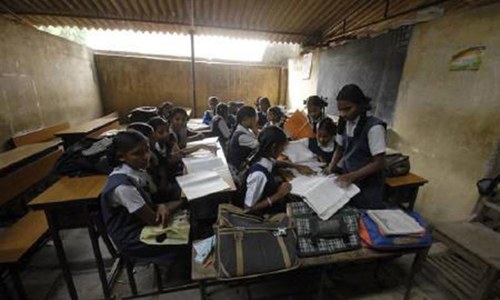ISLAMABAD: While a little over 6,000 active cases of Covid-19 have been left across the country, federal and the provincial governments will sit together on Monday (today) to decide about reopening of 300,000 educational institutions which have been lying closed for the last six months.
“Though it is correct that over 6,000 active cases of the Covid-19 have been left in the country, the biggest challenge, which can trigger spike of virus, is just ahead as we are going to open educational institutions in 10 days,” federal Minister for Planning, Development and Special Initiatives Asad Umar said told Dawn.
He said the government took every high risk event, such as Eidul Azha and Muharram, as a challenge and tried to ensure implementation of the standard operating procedures (SOPs) to prevent an increase in the number of Covid-19 cases.
“There are 50 million students, two million teachers and 300,000 educational institutions in the country. So we need to be extra vigilant to ensure implementation of SOPs. Representatives of the federal and the provincial government will sit together on Monday (today) to decide about the course of action for reopening of schools,” he said.
“In the past we dealt smartly with the high risk events such as cattle markets, Eid prayers and Muharram processions. However, reopening of educational institutions is a far bigger high risk event and we are making special preparations to deal with it,” he said.
NCOC puts total number of active Covid-19 cases in Pakistan at 6,269
The minister hoped that, with the cooperation of the provinces and under the umbrella of the National Command and Operation Centre (NCOC), the country would pass through the next phase of the pandemic successfully.
Meanwhile, the NCOC on Sunday announced that total active Covid-19 cases in Pakistan had dropped to 6,269. It claimed that only 85 ventilators, out of 1,912 allocated for Covid-19 patients, were in use and there was no patient on ventilator in Azad Jammu and Kashmir (AJK), Gilgit-Baltistan and Balochistan.
The NCOC claimed that so far 2.7 million tests had been conducted across the country.
According to a presentation given to the NCOC and available with Dawn, the positivity ratio among daily tested samples was 24.25 per cent on June 1 but then it started dropping and for the last 20 days the ratio has declined to less than two per cent.
As per the presentation, Covid-19 mortality rate has also fallen in Pakistan as 125 patients died on June 15 but less than a dozen mortalities were being reported for the last 20 days, with the exception of one day, Sept 2, when 18 mortalities were reported.
On June 15 there were 518 patients on ventilators but there have been less than 100 on ventilators for the last one week. Though 7,101 healthcare workers have been infected with the virus, 81pc of them have recovered.
While national ratio of tests is 12,928 per million people, the graph of province-wise tests shows that Islamabad is far ahead as compared to the provinces, AJK and GB. In Islamabad 140,985 tests per million people have been conducted, in Sindh 21,928, in GB 15,855, in Punjab 9,106, in AJK 8,471, in Khyber Pakhtunkhwa 8,205 and in Balochistan 6,277.
Mr Umar said even about 6,000 active cases showed that the virus was alive in Pakistan and there was need to take further steps to control it.
“We have to continue our efforts to control and eradicate the virus because otherwise possibility of reoccurrence of virus cannot be rejected,” he said.
The decision to open the educational institutions will be made at a meeting of the inter-provincial education ministers’ conference (IPEMC).
The IPEMC will review the Covid-19 situation and, in accordance with health ministry’s guidelines, take a decision whether to reopen all educational institutions from the already announced date of Sept 15 or not.
Read: Allowing all schools in Pakistan to reopen simultaneously breaches the bounds of prudence
The meeting, according to sources, will also finalise and approve the SOPs to be adopted by educational institutions.
Some officials of the education ministry said there were chances that the meeting would allow staggered re-opening of educational institutions or on alternate day opening of junior and senior classes to avoid gathering in schools and colleges.
The educational institutions of the country were closed on March 15 due to Covid-19 pandemic.
Earlier, the government had announced reopening of the institutions from Sept 15, subject to recommendations of the IPEMC.
The meeting will also discuss issue of shortened academic syllabus and examinations in 2021, the sources said. Federal Education Minister Shafqat Mahmood will brief the provincial education ministers about the progress so far made on single national curriculum.
The federal government in collaboration with the provinces is set to introduce uniform education system in the country in three phases, to provide all students of the country equal opportunities to excel. The first phase, according to Mr Mahmood’s recent statement, will be launched in April next year in all public and private primary schools and at the start of the academic year in seminaries. The next two phases will be launched in 2022 and 2023.
According to the sources, during the IPEMC, details of recently formed anti-bullying and anti-harassment committees notified by Federal Directorate of Education for Islamabad-based schools and colleges will also be shared with the provincial ministers so that, if convinced, they could form such committees in educational institutions of their provinces.
The sources said the education ministers would also discuss the transition plan of Basic Education Community Schools and National Commission for Human Development.
For Islamabad-based educational institutions, the federal education ministry had already decided that Saturday will be working day until examinations while remedial classes will be held in place of winter vacations to help students mitigate their loss, which they have faced during Covid-19 epidemic.
Published in Dawn, September 7th, 2020












































